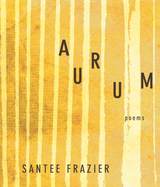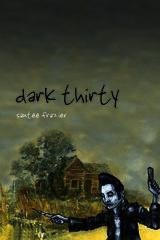2 books about Frazier, Santee

Aurum
Poems
Santee Frazier
University of Arizona Press, 2019
Unflinching and magnetic, the language and structure of Aurum never strays from its dedication to revealing the prominent reality of Native people being marginalized and discarded in the wake of industrial progress. While uncovering different forms of oppression that estrange Native Americans from their own land, these poems explore the raw and disturbing aspects of living in the wastelands of contemporary America.
Aurum does not attempt to provide answers or solutions. Instead, it splits the belly of North America and lays it bare into powerful words and unconventional structures. Brutally honest and incredibly fine tuned, this collection digs up “the grit where teeth once rooted” to show the objectification of Native peoples and cultures for the grotesque erasure it really is.
With images that taunt, disturb, and fascinate, Aurum captures the vibrantly original language in Santee Frazier’s first collection, Dark Thirty, while taking on a completely new voice and rhythm. Each poem is vivid and memorable, beckoning to be read again and again as the words lend an enhanced experience each time. Frazier has crafted a wrought-iron collection of poetry that never shies away from a truth that America often attempts to ignore.
Aurum does not attempt to provide answers or solutions. Instead, it splits the belly of North America and lays it bare into powerful words and unconventional structures. Brutally honest and incredibly fine tuned, this collection digs up “the grit where teeth once rooted” to show the objectification of Native peoples and cultures for the grotesque erasure it really is.
With images that taunt, disturb, and fascinate, Aurum captures the vibrantly original language in Santee Frazier’s first collection, Dark Thirty, while taking on a completely new voice and rhythm. Each poem is vivid and memorable, beckoning to be read again and again as the words lend an enhanced experience each time. Frazier has crafted a wrought-iron collection of poetry that never shies away from a truth that America often attempts to ignore.
[more]

Dark Thirty
Santee Frazier
University of Arizona Press, 2009
Writing sometimes in dialect, sometimes in gunshot bursts, sometimes in sinuous lines that snake across the page, Santee Frazier crafts poems that are edgy and restless. The poems in Dark Thirty, Frazier’s debut collection, address subjects that are not often thought of as “poetic,” like poverty, alcoholism, cruelty, and homelessness. Frazier’s poems emerge from the darkest corners of experience: “I search the cabinet and icebox—drink the pickle juice / from the jar. Bologna, / hard at the edges, / browning on the kitchen / table since yesterday. / I search the cabinet and icebox—the curdling / milk almost smells drinkable.”
Dark Thirty takes us on a loosely autobiographical trip through Cherokee country, the backwoods towns and the big cities, giving us clear-eyed portraits of Native people surviving contemporary America. In Frazier’s world, there is no romanticizing of Native American life. Here cops knock on the door of a low-rent apartment after a neighbor has been stabbed. Here a poem’s narrator recalls firing a .38 pistol—“barrel glowing like oil in a gutter-puddle”—for the first time. Here a young man catches a Greyhound bus to Flagstaff after his ex-girlfriend tells him he has fathered a child. Yet even in the midst of violence and despair there is time for the beauty of the world to shine through: “The Cutlass rattling out / the last fumes of gas, engine stops, / the night dimly lit by the moon / hung over the treetops; / owls calling each other from / hilltop to valley bend.”
Like viewing photographs that repel us even as they draw us in, we are pulled into these poems. We’re compelled to turn the page and read the next poem. And the next. And each poem rewards us with a world freshly seen and remade for us of sound and image and voice.
Dark Thirty takes us on a loosely autobiographical trip through Cherokee country, the backwoods towns and the big cities, giving us clear-eyed portraits of Native people surviving contemporary America. In Frazier’s world, there is no romanticizing of Native American life. Here cops knock on the door of a low-rent apartment after a neighbor has been stabbed. Here a poem’s narrator recalls firing a .38 pistol—“barrel glowing like oil in a gutter-puddle”—for the first time. Here a young man catches a Greyhound bus to Flagstaff after his ex-girlfriend tells him he has fathered a child. Yet even in the midst of violence and despair there is time for the beauty of the world to shine through: “The Cutlass rattling out / the last fumes of gas, engine stops, / the night dimly lit by the moon / hung over the treetops; / owls calling each other from / hilltop to valley bend.”
Like viewing photographs that repel us even as they draw us in, we are pulled into these poems. We’re compelled to turn the page and read the next poem. And the next. And each poem rewards us with a world freshly seen and remade for us of sound and image and voice.
[more]
READERS
Browse our collection.
PUBLISHERS
See BiblioVault's publisher services.
STUDENT SERVICES
Files for college accessibility offices.
UChicago Accessibility Resources
home | accessibility | search | about | contact us
BiblioVault ® 2001 - 2024
The University of Chicago Press









